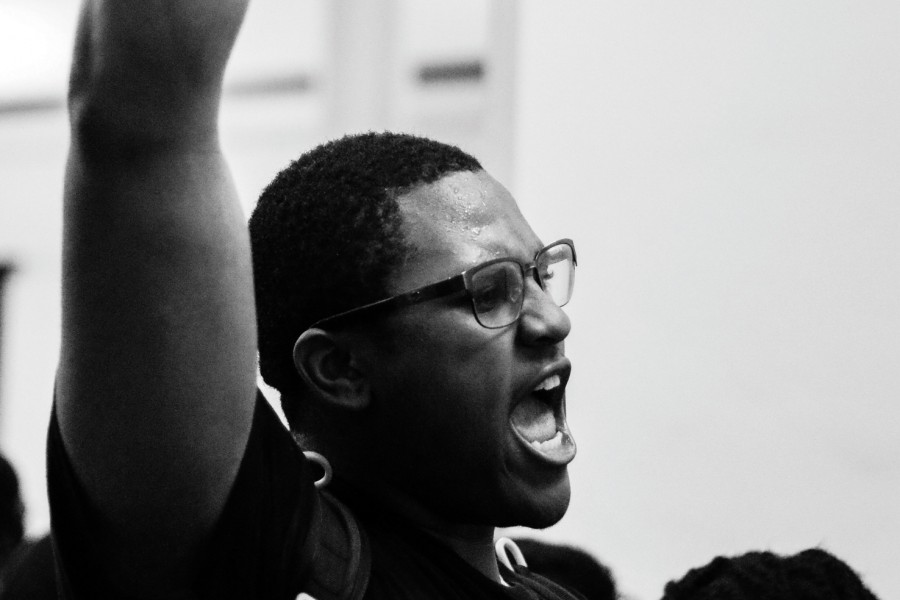Racial Tensions Erupt at Mizzou
January 5, 2016
On a normal day at the University of Missouri, Chelsea Haynes walks around campus, smiling and conversing with her fellow classmates. In recent months, however, Haynes’s daily life has taken a rather dramatic turn: as racial threats and tensions begin to take center stage at the university, Haynes now often finds herself surrounded by various protests and camp outs, and isolated by her peers—all because of the color of her skin.
“[Sometimes] people will kind of look at you in a funny way, just because you are black on campus,” Haynes said. “It’s definitely interesting.”
The issue of racism in America has had a long history, and the recent student protests at the University of Missouri, or Mizzou, have helped bring these issues into the light. To the black students at Mizzou, however, racial issues are hardly a new concept. The recent uproar of racial tensions can be traced back to the spring of 2010, when an incident involving the scattering of cotton balls outside the university’s Black Culture Center caused a disturbance. Seen as a racist act and undeniable reminder of slavery, the alleged student offenders were arrested. However, this failed to quell the worries of the black students on campus; problems only continued to intensify as subsequent events brought heated tensions to a boil.
“I was aware of everything that was happening on campus, but [problems] didn’t just start with racial tensions. There were a lot of different things that were going on,” Haynes said. “It was the [student] protests that kind of got everything going.”
In a recent occurrence on the social media platform Yik Yak, anonymous threats were posted to the site detailing plans of a school shooting. These threats caused some black students to evacuate the campus out of fear.
“[Black students] got a lot of threats on campus. Other people have received a lot of threats as well, especially on the night of [Tuesday, November 10th], when the threats first broke news,” Haynes said. “I actually had to go off campus [that day], because I was so scared as to what was happening.”
While many students at Mizzou have not directly experienced racism, many have seen their peers endure non-physical aggressions on campus.
“I have seen my peers use microaggressions or write pseudo-informed Facebook statuses that definitely contribute to the ‘us versus them’ theme that I believe has been prominent throughout the last few weeks,” Hanna Yowell said.
Since the threats and protests began, Mizzou students, staff, and faculty have noticed changes on campus. These changes have been very different for each person in the community. Leah Hoelscher, a sophomore at the university and a City High alumna, admires the evolving climate on campus. For her, the protests and newfound solidarity between the student body have made her appreciate Mizzou even more than she did before.
“I now love Mizzou football for standing up for what they believe in over a game. I love our campus for allowing marches, protests, sit-ins, campouts, and prayer services,” Hoelscher said. “I love my fellow students for bonding together to support marginalized students on campus. I love our professors for respecting the safety concerns of our students on campus.”
News of the events on the Mizzou campus has spread across the country, mostly through news outlets and social media. The hashtag #BlackOnCampus brought worldwide attention to the issue. Many social justice activists on the social media site have tweeted about it. The twitter account for Concerned Student 1950, a student organization at the University of Missouri, started the trend by tweeting, “Black Students and black alum, tell us your experiences as a marginalized student. Hashtag #BlackOnCampus.”
This hashtag was met with personal accounts and displays of support for the students tweeting, as well as tweets disagreeing with the movement.
“Privilege was me being moved out of my dorm, because my roommate was afraid of me. She simply learned [about] blacks from TV. #BlackOnCampus.” Twitter user @AurielEbonie said. This point is made often throughout the tweets under this hashtag. According to the tweets many black students feel alienated on their campuses.
“Being told as a student reporter that wearing your natural hair isn’t professional & you must remain ‘consistent’. #BlackOnCampus.” @kimayak_Davis tweeted.
The administration has played a large role in the happenings at Mizzou. Former Mizzou president Timothy Wolfe and former chancellor R. Bowen Loftin resigned following various protests across campus, notably those of the Mizzou football team and graduate student Jonathan Butler’s hunger strike. In his resignation speech, Wolfe acknowledged the concerns and anger of the students, faculty, and staff.
“So the question really is, is why did we get to this very difficult situation. It is my belief we stopped listening to each other. We didn’t respond or react. We got frustrated with each other, and we forced individuals like Jonathan Butler to take immediate action and unusual steps to effect change,” Wolfe said. “This is not, I repeat not, the way change should come about. Change comes from listening, learning, caring, and conversation. We have to respect each other enough to stop yelling at each other and start listening, and quit intimidating each other.”
While the University of Missouri faculty and staff have not made many public comments on the issues at hand, they maintain support for their students.
“My Spanish teacher is a large advocate for student’s rights on campus, so classes were canceled in order to give students the ability to attend the protests,” Hoelscher said. “Any other conversations during class times have just been blanket statements from professors of their support, and we have moved on with class.”
Hoelscher supports Wolfe’s resignation, but understands that the resignation of one individuals will not mend the racial tensions at Mizzou.
“It’s not like everyone was blaming him for the racism experienced at Mizzou, but it was his job as the figurehead of an institution to set an example and to be an effective leader. He failed to do this,” Hoelscher said. “I believe that the people in charge of institutions have an important responsibility to actually care about the individuals they represent, and Wolfe clearly didn’t.”

































